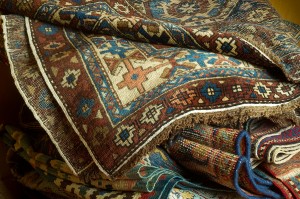For hundreds of years, Persian carpets – or Persian rugs – have been an important aspect of the Iranian economy. Carpet-weaving has also become a fixture in Persian art and culture, and traces its origins to ancient Persia. Iranians are born on carpets and when they perish they are covered by carpets.
Economically, the Persian rug market is so big that it supplies nearly one-third of the world’s market.
Despite dire sanctions that have been applied to Iran by the Western community, the nation’s carpet exports reached $57 million in the first quarter of the Iranian calendar year that officially began on Mar. 20, 2014.
 According to a report from Iran’s National Carpet Center (NCC), the country exported 1,000 tons of hand-made carpet to close to 80 countries, including the United Kingdom, Sweden, Germany, Japan and the United Arab Emirates (UAE). These exports generated $57 million in revenues – the U.S. also imported $51,000 worth of Iranian hand-woven carpets.
According to a report from Iran’s National Carpet Center (NCC), the country exported 1,000 tons of hand-made carpet to close to 80 countries, including the United Kingdom, Sweden, Germany, Japan and the United Arab Emirates (UAE). These exports generated $57 million in revenues – the U.S. also imported $51,000 worth of Iranian hand-woven carpets.
In the nation’s calendar year 2012-2013, Iran’s Persian rug market exports garnered $427 million, down more than 26 percent from the previous year when they earned $560 million. There are approximately 1.2 million carpet weavers in the Middle Eastern country that produce five million square meters every year – 80 percent of that is exported.
“In provinces, cities and villages across the country, people are involved in or familiar with carpet weaving. They developed motifs, designs and patterns that reflect their part of Iranian culture,” said Hamid Karghar, head of Iran National Carpet Center, in an interview with the Global Post.
Mojtaba Feuzollahi, the deputy director of the NCC, noted earlier this year that nearly half of all its total carpet exports are distributed to European nations. “Iran still remains the world’s top carpet exporter,” he told reporters.
Although hand-woven carpets provide a steady source of employment and income for families – this trade has been passed down from generation to generation – sanctions are still hurting every facet of the Iranian economy.
It was reported by Reuters in 2012 that U.S. sanctions prohibit the import of carpets made in Iran from entering the country, which has taken away profits from domestic rug sellers. Also, there are sanctions on payments to and from Iran, a measure that has made it even harder to touch other markets around the world.
It isn’t just Iran’s carpet market that is suffering under sanctions, but also rose water, Iranian sheep intestines and pistachios because Iranian financial institutions are being dismissed by the European Union.
Experts say that sanctions imposed by the U.S., the EU and the United Nations are illogical and ill-conceived.
“There seems to be very little co-ordination or strategy behind the sanctions. We are also seeing that EU sanctions are interpreted slightly differently in each member state,” said Michael Tockuss, business manager of the chamber.
Moving ahead, there doesn’t seem to be any reprieve for Iran. One rug maker thinks the sanctions are making life worse each passing day.



